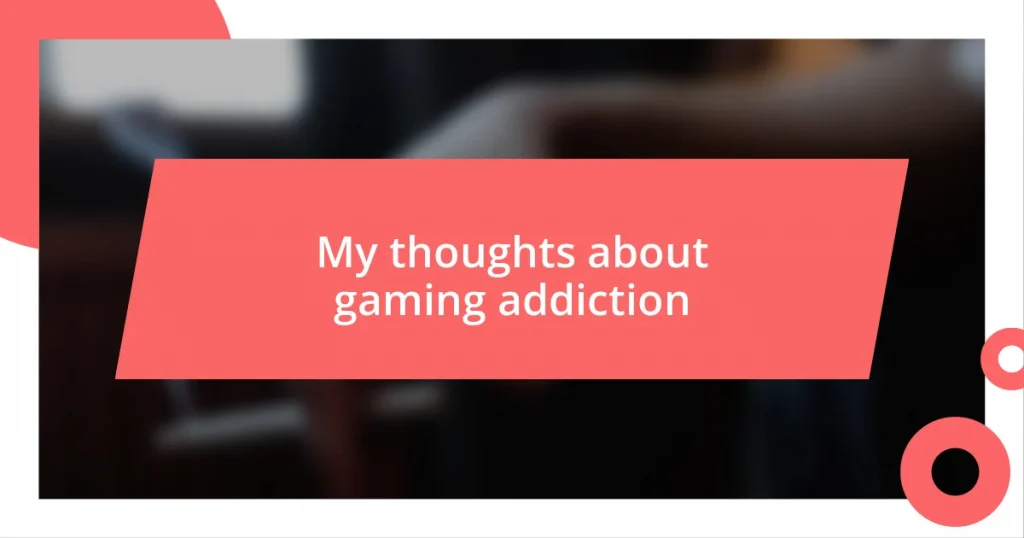Key takeaways:
- Signs of gaming addiction include neglecting responsibilities, irritability over social gatherings, and experiencing withdrawal symptoms when cutting back on gaming time.
- Strategies for balancing gaming and real life involve setting time limits, prioritizing responsibilities, and engaging in offline activities with friends and family.
- Seeking help through professional therapy, support groups, and self-help resources is crucial for those struggling with gaming addiction and can lead to a more balanced life.
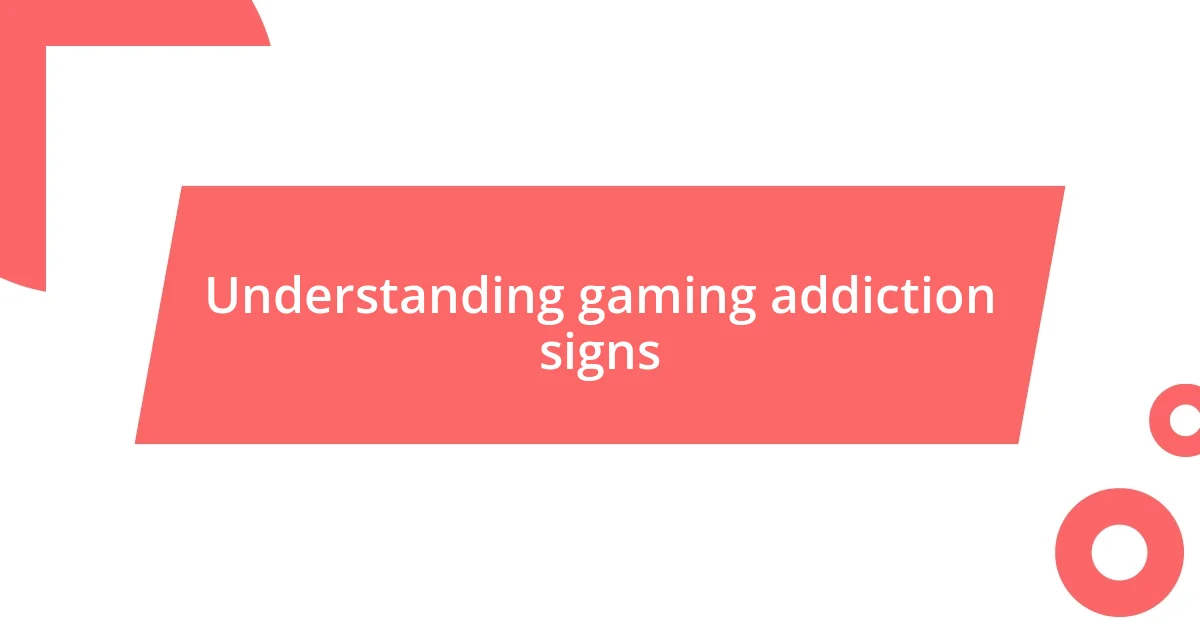
Understanding gaming addiction signs
Noticing the signs of gaming addiction can sometimes feel like peering into a foggy mirror; the reflection isn’t always clear. I remember a friend who would become irritable whenever we suggested hanging out. It didn’t click right away, but it soon became obvious that he prioritized his gaming sessions over social interactions. Have you ever felt that uneasy tension when it seems like someone you care about is slipping away into the depths of their virtual world?
Another sign that often goes unnoticed is the neglect of responsibilities. I once stumbled across someone who was a straight-A student, but then grades began slipping and even simple chores went undone—all in favor of conquering the next level. It’s alarming how quickly gaming can take precedence over everyday life, making me wonder: What drives someone to sacrifice their well-being for a virtual achievement that has no significance outside the screen?
Lastly, I’ve observed that withdrawal symptoms can emerge when gamers are forced to step away from their consoles. There’s this strange psychological tug I’ve felt myself when trying to cut back on playtime; I experienced restlessness and anxiety that hinted at a deeper issue. Have you noticed similar feelings of unease when thinking about reducing your gaming hours? It’s a powerful reminder of how deeply gaming can weave into our lives, subtly transforming enjoyment into dependency.
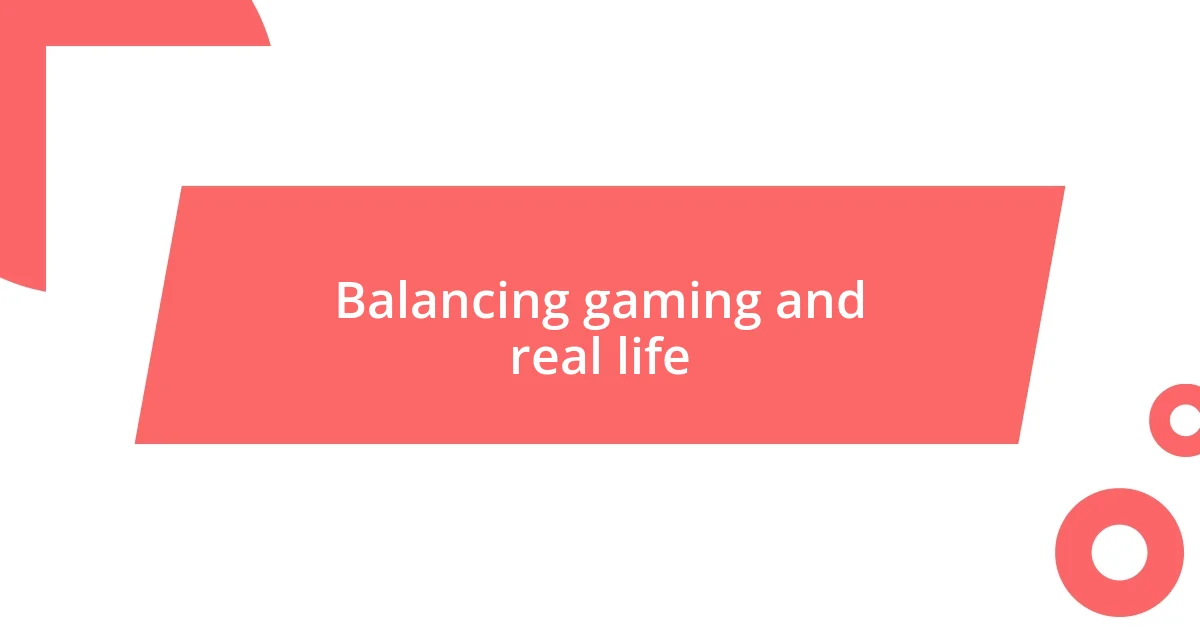
Balancing gaming and real life
Finding a healthy balance between gaming and real life can sometimes feel like walking a tightrope. I recall a time when I got so engrossed in an online game that I completely lost track of my commitments. Friends started reaching out for social gatherings, and each time I chose to stay in, the guilt piled up. It hit me one day when a close friend told me he felt neglected; that revelation was like a wake-up call. No game is worth losing precious connections.
To establish a safe equilibrium, consider these strategies:
– Set specific gaming hours to create boundaries around your time.
– Prioritize real-life responsibilities before diving into gaming sessions.
– Engage in offline activities with friends and family to reignite those connections.
– Reflect daily on how gaming affects your emotions and interactions.
– Remember to give yourself permission to step away from the screen.
These steps can lead to a more fulfilling life, allowing the joys of gaming to coexist with the richness of real-world experiences.
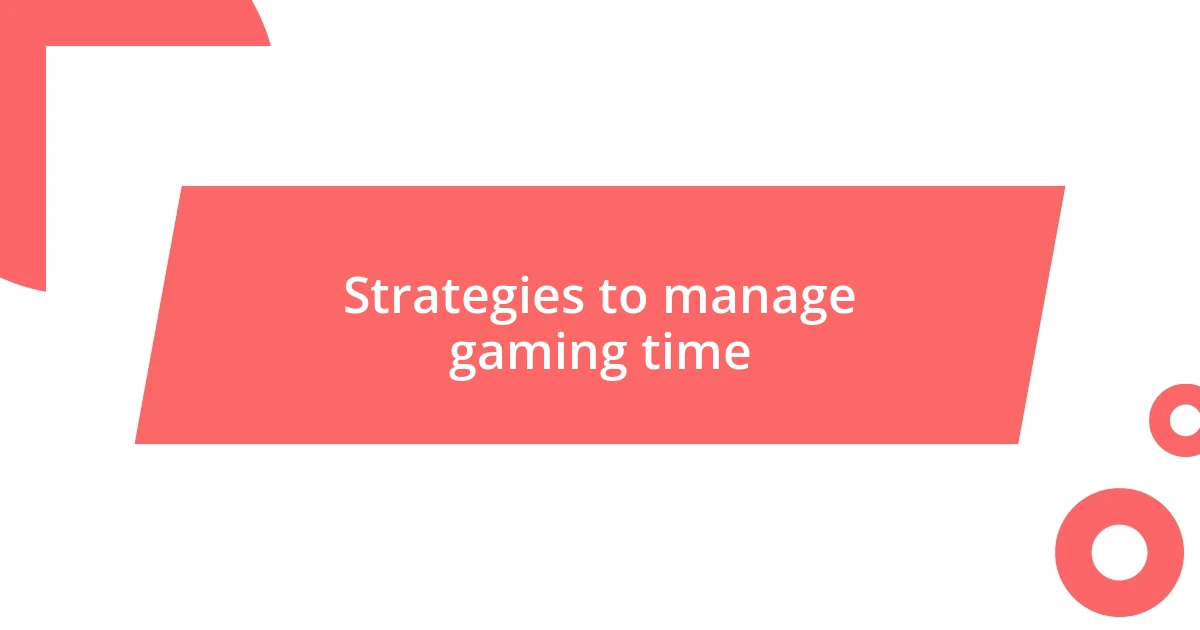
Strategies to manage gaming time
Managing gaming time can feel like a balancing act, and I’ve often found that setting clear limits is vital. For instance, I started using a timer during my gaming sessions. It served as a gentle nudge to remind me to wrap things up and keep my real-world responsibilities in check. Have you ever considered how much a simple timer can shift your focus? It’s a small strategy but has made a significant difference in how I allocate my time.
Another effective approach is prioritizing my commitments before indulging in gaming. I once had a week where I made it a point to complete household chores and finish work tasks before logging in for even a minute of gameplay. At first, I thought it felt restrictive, but I was honestly surprised at how satisfying it was to tick everything off my to-do list first. I’ve learned that when I manage my time well, I can enjoy gaming guilt-free.
Lastly, creating offline experiences can add depth to my daily life. One memorable evening, I invited friends over for a movie night instead of getting lost in an online game. The laughter and shared stories that night reminded me of why those friendships matter so much. Have you thought about how enriching real-life interactions can feel? Diving into activities away from the screen not only helps balance my life but also rekindles those vital connections.
| Strategy | Description |
|---|---|
| Set Time Limits | Using a timer to regulate gaming hours discourages excessive play and promotes balance. |
| Prioritize Responsibilities | Completing chores or work before gaming leads to guilt-free relaxation afterward. |
| Engage in Offline Activities | Spending quality time with friends and family enriches life beyond gaming. |
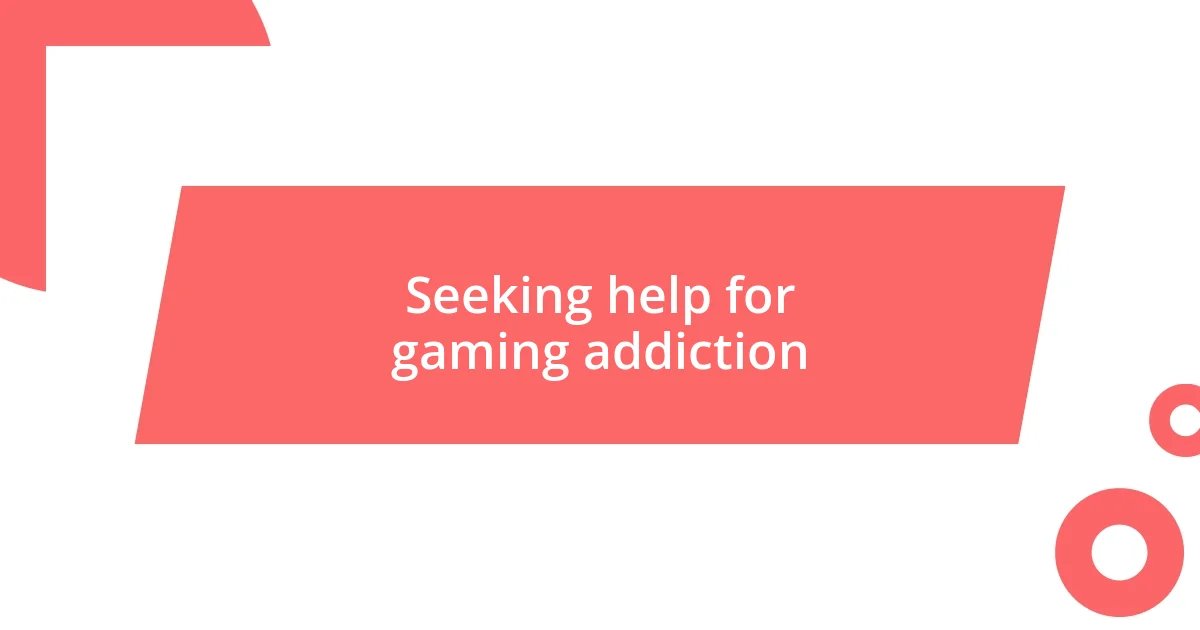
Seeking help for gaming addiction
Seeking help for gaming addiction can be a daunting step, yet it’s often one of the most crucial. I remember a time when I sat down with a close friend who had reached out because he felt overwhelmed by his gaming habits. As we talked about his struggles, it became clear that seeking support from loved ones can usher in the change needed to break the cycle. Have you ever confided in someone about your gaming habits? It can be incredibly liberating.
Therapy or counseling can also play an essential role in addressing gaming addiction. In my experience, discussing my feelings with a professional opened my eyes to underlying issues I hadn’t fully recognized—like anxiety and loneliness—that fueled my gaming habits. If you think about it, having someone to guide you through this journey of self-discovery can be life-changing, don’t you agree?
Support groups, both online and offline, can create a sense of community and understanding among those facing similar challenges. I once joined a local meet-up for gamers looking to reduce their screen time. Sharing my stories and hearing others’ experiences was surprisingly uplifting. We often forget that we are not alone in our struggles, and sometimes it’s the collective sharing of experiences that brings the most healing. Have you considered reaching out to others who may share your journey? It might just be the first step toward reclaiming a balanced life.
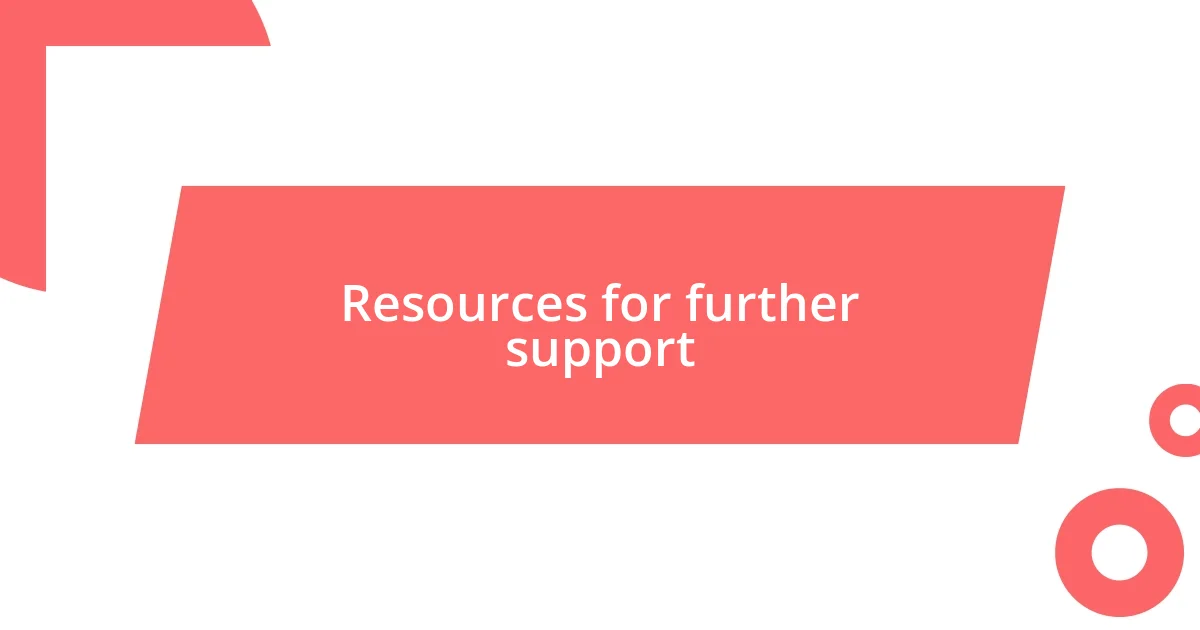
Resources for further support
When looking for resources to support gaming addiction, I can’t emphasize enough the value of professional help. I vividly recall a time when I stumbled across a local mental health clinic specialized in addiction issues. Attending their workshops opened up my eyes to not only my gaming habits but also other areas in my life that needed attention. Have you ever wondered how much more clarity you could gain from talking to someone trained in these challenges?
There are also online platforms, such as forums and support groups, dedicated to gamers battling addiction. I once found solace in a community dedicated to discussing gaming responsibly, where members shared strategies and success stories. It felt reassuring to know that I wasn’t alone and that others were navigating similar paths. Isn’t it empowering to learn from those who truly understand your situation?
Moreover, there are countless self-help books and resources available that provide practical tips and psychological insights on managing gaming habits. I fondly remember diving into a book that not only covered the ‘why’ behind addiction but also offered a variety of strategies to implement in daily life. What if you found just one piece of advice in a book that changed your perspective entirely? You never know where inspiration might lead!
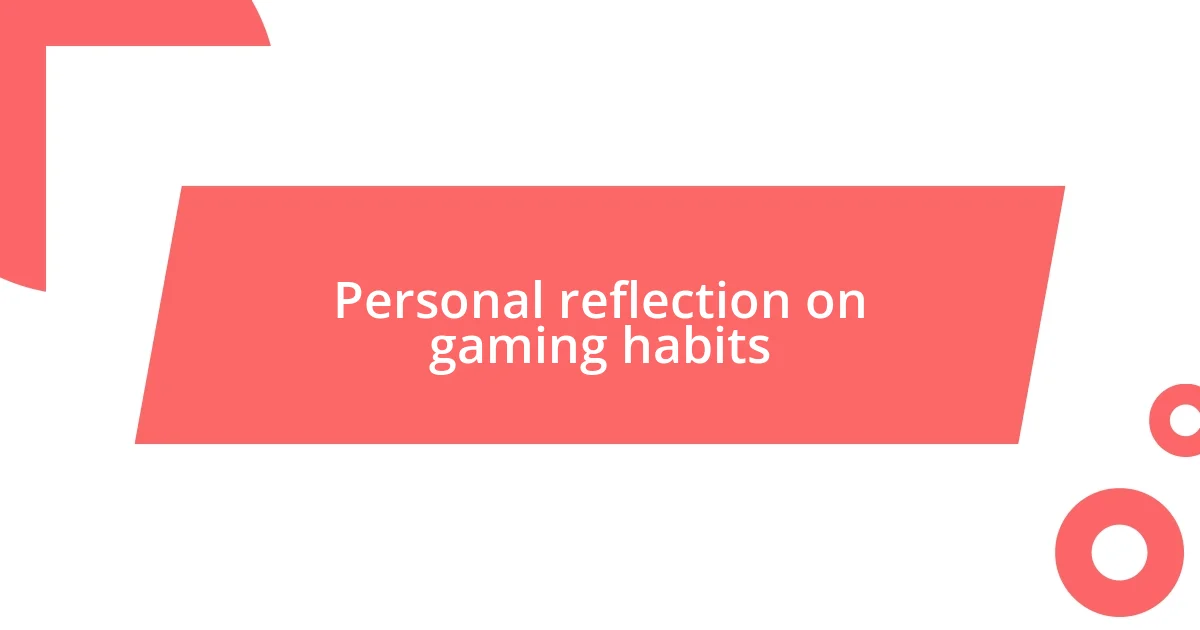
Personal reflection on gaming habits
Reflecting on my own gaming habits, I can’t help but recognize how easily it was to lose track of time. I once spent an entire weekend engrossed in a game, completely neglecting responsibilities and social interactions. Have you ever found yourself staring at the clock, wondering where the hours went? It’s a strange mix of excitement and regret.
Looking back, I realize that gaming served as both an escape and a comfort during stressful times. There were moments when I used video games as a way to disconnect from the day-to-day grind, which often felt overwhelming. While it provided a temporary sense of relief, I learned that a balance is key. Isn’t it interesting how what feels like a harmless hobby can morph into something that overshadows other parts of our lives?
Sometimes, I contemplate the emotional rollercoaster that gaming can bring. I vividly recall the adrenaline rush during intense matches, followed by the inevitable lows when things didn’t go as planned. That kind of dichotomy made me question my motivations for playing. Do I seek joy, or is it sometimes just a distraction? It’s crucial to examine those underlying feelings and identify whether gaming enhances our lives or complicates them.










